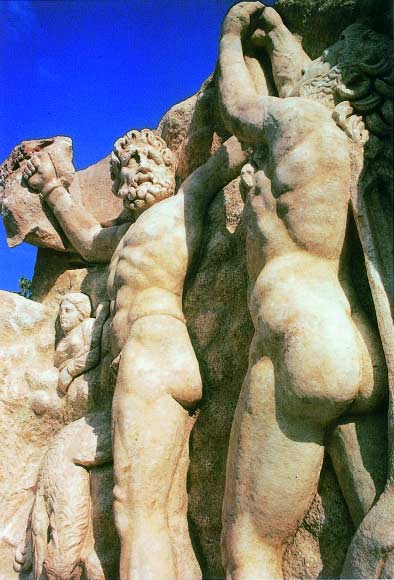


"Prometheus and Herakles"
Classic style relief, Marble, Unknown
Hesiod wrote two works involving Prometheus, the first being the Theogony. The section in which he appears is lines 509-572. It is a detailed account of his binding and also includes the tale of how Prometheus tricked Zeus into taking the bones and fat of the sacrifice instead of the actual meat. Lastly it tells of the stealing of fire for mortals who live on earth. In return for Prometheus's stealing fire, Zeus sends evil into the world in the form of the first woman, Pandora.
The second work of Hesiod that includes Prometheus is the Works and Days. This is a much briefer account that recites Prometheus's actions to trick Zeus and says that is why Zeus made life hard for humans. Zeus gave humans Evil in return for Prometheus stealing humans Fire. The evil came in the form of Pandora, who was given to Epimetheus, Prometheus's brother. Instead of sending her back as Prometheus advised, Epimetheus kept her and she opened the jar that let evil and hope into the world. The section is lines 58-76.
Apollodorus wrote many short tales involving Prometheus in his Library and Epitome. He first mentions Prometheus's birth to Iapetos in 1.2.2, in 1.3.6 he is involved in the Zeus and Metis myth as the one who cracks Zeus's skull to release Athene. 1.7.1 tells the first myth in which Prometheus is a central character. In it he moulds humankind from clay and sneaks humans fire in the fennel stalk. In 2.5.4 Prometheus, who originally was a mortal in this version, takes Chiron's immortality so the centaur can die and have peace from the pain of a poison. Zeus punished Prometheus for stealing fire by tying him to Mt. Caucasus and setting an eagle to eat his liver every day and had the liver regrow every night. He was rescued by Herakles in 2.5.11. In gratitute for being rescued, Prometheus told Herakles how to trick Atlas into getting him the golden apples. Lastly, in 3.13.5 Prometheus tells Zeus not to have a child with Thetis as the child would be greater than his father.
Aeschylus wrote a trilogy of plays about Prometheus of which only one is still extent. It is Prometheus Bound. It begins with Hephaistos reluctantly binding Prometheus on Zeus's orders. Then it tells why Prometheus was bound, the story of the war between the titans and the gods and what happened after between Zeus and humanity. Prometheus requests that Oceanos not intercede on his behalf with Zeus because he has foresight that Zeus will set him free to learn the prophecy. Prometheus also tells Io of the suffering she will endure. Hermes is sent to try to get the prophecy about Zeus and Thetis from Prometheus, although Thetis is never named. The prophecy is the one that says that Thetis's son will be greater than his father. Obviously if Zeus was to beget her son, this son would overthrow Zeus. The play ends with Prometheus being tortured. Promethean foresight is emphasized throughout the play.
Diodorus Siculus writes of Alexander's visit to the location where Prometheus was chained in the Caucasus. This is told in 17.83.1 of his Library. He also says that Prometheus did not steal fire, but instead discovered the things that gave fire and from which it may be kindled at 5.67.1.
Promethean Myth Interpretations
Background credit -- Prometheus and Zeus' Attacking Eagle (1989) Artist: Gabor Peterdi (Jane Haslem Gallery -- see directly below)